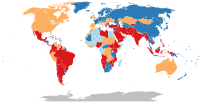
Photo from wikipedia
Abstract Marketplaces are regarded as quintessential public spaces, providing not only access to fresh produce but also functioning as important social infrastructures. However, many marketplaces closed down or changed fundamentally… Click to show full abstract
Abstract Marketplaces are regarded as quintessential public spaces, providing not only access to fresh produce but also functioning as important social infrastructures. However, many marketplaces closed down or changed fundamentally in response to the COVID‐19 coronavirus outbreak. In this paper, we reflect on the effects of the crisis on Dutch marketplaces from two interdependent analytical levels. From a ground level, we illustrate their ‘temporary death’ as public spaces and reflect on their changing social dynamics. From an organisational level, we analyse traders’ responses to the institutional measures taken to combat the crisis. Combining pre‐corona, in‐situ research with (social) media analysis, we show how a variegated institutional landscape of market regulation emerged. Whereas some markets closed down, others remained open in a highly regulated manner; representing merely economic infrastructures. Our first reflections lead to new avenues to explore how the COVID‐19 crisis affects the everyday geographies of public space.
Journal Title: Tijdschrift Voor Economische En Sociale Geografie
Year Published: 2020
Link to full text (if available)
Share on Social Media: Sign Up to like & get
recommendations!